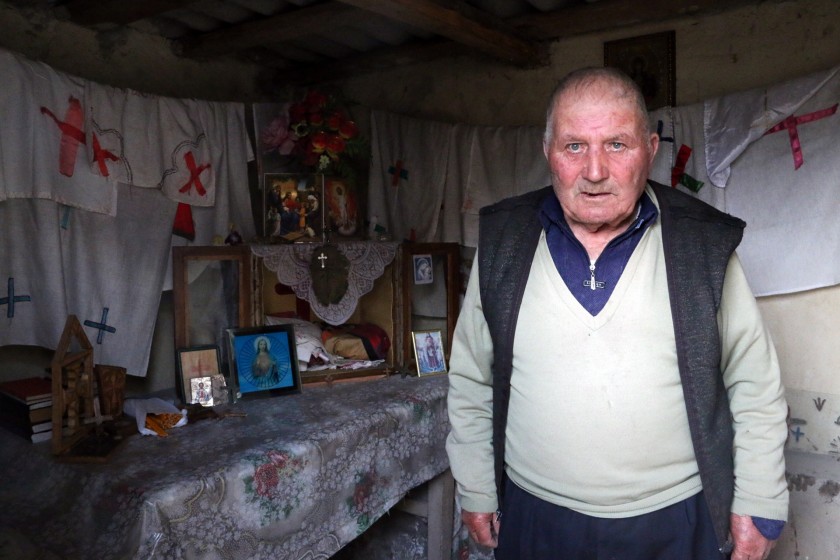
92-Year-Old WWII Vet: “After capturing the Reichstag, we ate our fill”
Marine Martirosyan
Hrachik, a 92-year-old veteran of the Great Patriotic War (WWII) danced the kochari when the Soviet Army captured the Reichstag of Nazi Germany in May, 1945.
It was the apex of the Battle of Berlin. The city’s garrison had surrendered but fighting continued until the end of the war in Europe on May 8 (May 9 in the Soviet Union).
“After capturing Berlin, we had a big meal to make up for all the days we went hungry,” says Hrachik, a native of Litchk, a village in Armenia’s Gegharkounik province.
The WWII vet’s recollections of the war years are fresh.
Hrachik was one of five children; two boys and three girls. The eldest of the boys, Hrachik says he was sent to the front because his mother couldn’t pay the 150 rubles demanded to get the boy accepted into the tenth grade. Hrachik’s father was already fighting on the frontlines. Their paths never crossed. The father returned from the war before Hrachik did.
“They sent me to the front in December 1944. I was in the fourth division commanded by Zhukov. I operated a 152-mm cannon in the 137th artillery battalion. We went all the way to Berlin.”
Hrachik and his fellow soldiers spent six months in Berlin after its capture. He remembers being cautioned not to accept vodka and food offered by the Germans because it might be poisoned.
“The Germans poisoned many. They warned us about it,” Hrachik recounts.
 “They were burning buildings, blowing them up. We walked through it all. Some picked up gold there. I was a child and didn’t understand. There were abandoned houses. People seized whatever they wanted. I took a heart-shaped pendant and gave it to my father. He exchanged it for 200 kilograms of potatoes.”
“They were burning buildings, blowing them up. We walked through it all. Some picked up gold there. I was a child and didn’t understand. There were abandoned houses. People seized whatever they wanted. I took a heart-shaped pendant and gave it to my father. He exchanged it for 200 kilograms of potatoes.”
Hrachik made it back to Armenia on April 1, 1946. The days of going hungry continued. He remembers his mother patching his pants over and over. There was nothing to eat for days. They chewed on tzyut (a dried resin-gum made from herbs).
He married four years after returning from the war and had five children.
“I worked as a light controller for twelve years and twelve years in a pumping station.”
Two of Hrachik’s children live in Ukraine, the others in Armenia. 78-year-old Yelena is his third wife.
“My son has a car. I gave it to him. We’d drive around the countryside. There was this woman with children. She didn’t want to marry me. She was young. This one (referring to Yelena), is also a good girl. She worked in a factory. They said she was a bit lame from birth. This was pretty and I married her in 1983.”
Yelena never interrupted during my entire conversation with Hrachik. Hearing this, Yelena jumps in. “What about your second wife?” “Which one?” he asks. “Your second, the second,” she says.
“She was from our district. I took her as my wife. When I’d come home from work and ask if she’d cooked my dinner, she’d reply I don’t feel like cooking. She wasn’t the smartest around. I told her to scram. I kept her for nine months,” says Hrachik. Yelena cracks a smile.
Hrachik is content with his third wife. He says he’s a good cook. Yelena says that Hrachik goes to the Martouni market every Sunday to buy food.
The WWII vet gets a monthly pension of 50,000 drams (US$103). Yelena’s pension is 34,000. She’s says that her husband is a kindhearted soul that gives money to those in need; whether his children or fellow villagers.
The couple have a small garden where they grow potatoes and cabbage. Before my visit, Hrachik had bartered some potatoes for firewood from Dilijan. He had neatly piled it up in the yard.
Hrachik has fifteen grandkids. He wishes they stay far from harm’s way.
“Me and my old lady just want to eat and drink, and for them to bring dollars,” Hrachik says, laughing out loud, and Yelena joins in. She says that she’s a teetotaler, but that her husband imbibes on occasion. Hrachik chides her, claiming that she’s been known to throw back a tumbler with him.
“If my wife doesn’t love and respect me, I’d tell her to get lost,” says Hrachik, adding that love makes a family strong. His advice on life is never to covet thy neighbor’s possession. Work, and you’ll own stuff of your own.
As for generational change, Hrachik furrows his brows and exclaims, “They talk about the new generation and how it’s changed. My view is this. A parasite will begat a parasite child, and a good person will have a good, well-raised child.”
“Bring that vodka here. Do me a kindness. Let’s have one drink. Hey, wife. Set the table,” Hrachik says getting up.
We kindly refuse. The couple aren’t pleased. We’ve come to their house and won’t break bread with them. Another time, we say.
There’s a small shrine near the gate. It’s Saint Narek. Hrachik’s forbearers brought it with them when they relocated from Alashkert (present-day Eleşkirt, in Turkey) in 1830.
Hrachik says if one prays for something at the shrine, it comes to pass.
“I told you I don’t like those priests. But there’s a god up above. He confronts you with all that you’ve done in life,” Hrachik says as we leave.
Yelena calls out to me, “Light a candle. You must light a candle.”
Photos: Hakob Poghosyan
 Videos
Videos Photos
Photos




Write a comment